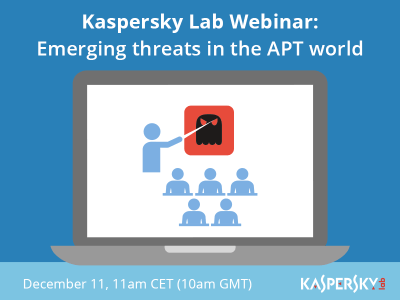
Minidionis: a malignant rain from the cloud
Minidionis is yet another backdoor from the same APT group responsible for CozyDuke, MiniDuke, and CosmicDuke – this time with some “cloud” capabilities.
116 articles

Minidionis is yet another backdoor from the same APT group responsible for CozyDuke, MiniDuke, and CosmicDuke – this time with some “cloud” capabilities.

Quite a few new APT campaigns were discovered in the last year and a half. Here is a glimpse of a potential landslide in the making with two of them.

Kaspersky Lab has just released its quarterly report on IT threats evolution. It’s full of woeful figures, showing that threats keep climbing. Judging by dynamics, this trend is here to stay for a time.

Kaspersky Lab has discovered an advanced attack on its own internal network and is sharing its investigation results. TL;DR – Customers are safe; neither products nor services have been compromised.

A new, Chinese-language APT has emerged, seeking geopolitical information and targeting nations in and around the South China Sea

Kaspersky Lab experts have investigated one of the most active APTs (Advanced Persistent Threats) in Asia, operating specifically around the South China Sea area. It was named “Naikon” after the “nokian” User-Agent substring within an attack components’ code.

Yet another APT of the ‘Dukes family’ is hitting high-profile targets, including the US government office.

Yet another Duke APT is hitting high-profile targets, including the US government office. This time it’s CozyDuke (also known as CozyBear, CozyCar or “Office Monkeys”, in honour of the video it employs as a decoy).

Kaspersky Lab experts have discovered a new APT campaign that targets government institutions, mainly in the APAC region. It was named “Hellsing” after the string containing the project directory name found within the attack components’ code.

Crouching Yeti, last year’s widely publicized APT campaign, is apparently still active, although the operator might have switched infrastructure, techniques, and targets.

Cybercriminals go at great lengths to throw researchers off their scent, but just like in the “offline” crime world they make errors and leave peculiar traces behind, making them look a bit silly, while the cyber-forensic experts get happy.

Kaspersky Lab researchers uncovered Desert Falcons, the first exclusively Arabic APT group, presenting their findings at the Security Analyst Summit in Cancun.

On February 16th and 17th in Cancun, Mexico, the Fourth annual Kaspersky Security Analyst Summit took place. Here are several chosen moments from the keynotes presented there.

The Carbanak APT group managed to steal a total of $1 bln from dozens of banks worldwide

Kaspersky Lab experts shared their predictions on the evolution of APT. While these predictions may not come true, they are based on facts and trends already observed.

Kaspersky Lab experts analyze the security and privacy trends that emerged in 2014, including anonymous Tor browsing, ransomware, APT attacks and more.

Costin Raiu, director of Kaspersky Lab’s Global Research and Analysis Team (GReAT) will be sharing his expert team’s predictions for 2015 during a special webinar on December 11. The predictions

In this Talk Security podcast, Threatpost’s Chris Brook and Brian Donohue discuss the move to encrypt the Web, the Regin APT campaign and more.

A new APT campaign called Regin targets the usual victims plus a prestigious cryptographer and the GSM standard on which most cellular communications occur.

In this episode of the Talk Security podcast, Threatpost’s Chris Brook and Brian Donohue discuss the Dark Hotel cyberespionage campaign and the WireLurker Apple malware.